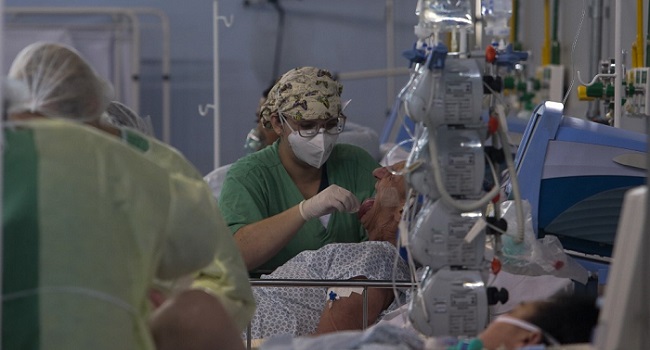Brazil is the country with the second-highest number of infections and deaths in the pandemic, after the United States, and the virus is still spreading quickly.
That is bad news in every way but one: it makes the South American country an ideal testing ground for potential vaccines against the virus.
The job of guinea pig falls to medical staff who work in facilities treating patients infected by the virus, because they are the most likely to come into contact with it, enabling researchers to run a controlled experiment to see how well it works.
“I want to contribute, and this is my contribution — through science,” said pediatrician Monica Levi, one of 5,000 volunteers in Brazil helping test one of the most promising vaccines so far, developed by Oxford University and pharmaceutical company AstraZeneca.
Levi, 53, works at the Specialized Clinic for Infectious and Parasitic Diseases and Immunizations (Cedipi) in Sao Paulo, the epicenter of the outbreak in Brazil, where more than 2.5 million people have been infected so far, with more than 90,000 deaths.
“Vaccination is my cause. So I have to act on my beliefs,” she told AFP.
Last week, Brazil also became the first country carrying out Phase 3 trials of Chinese vaccine CoronaVac, developed by pharmaceutical firm Sinovac Biotech.
Phase 3 clinical trials involve large-scale testing on humans, the last step before vaccines seek regulatory approval.
Medical workers play the starring role in testing that vaccine, too.
“They pick health care professionals because we are constantly at risk,” Levi said.
Volunteers must be between 18 and 55 years old, work in a patient care role and have no underlying medical conditions.
Half the volunteers in the Oxford trial are receiving the vaccine and the other half a placebo.
But they will only know which a year from now.
Levi got her shot on July 21, and had a headache and chills the first day, she said.
“But I don’t even know if they gave me the vaccine or the placebo,” she added.
While she waits to find out — and to learn whether the vaccine is the exit from the pandemic that the whole world is hoping for — she goes to regular check-ups where researchers monitor her health.
Scientists worldwide are racing to develop and test a vaccine for the virus. There are more than 150 projects so far.
But there are no guarantees in the high-stakes race.
Brazil has a deal to make up to 100 million doses of the Oxford vaccine if it proves effective.
But if it doesn’t, said Levi, “it will all go in the garbage.”

Comments
Post a Comment